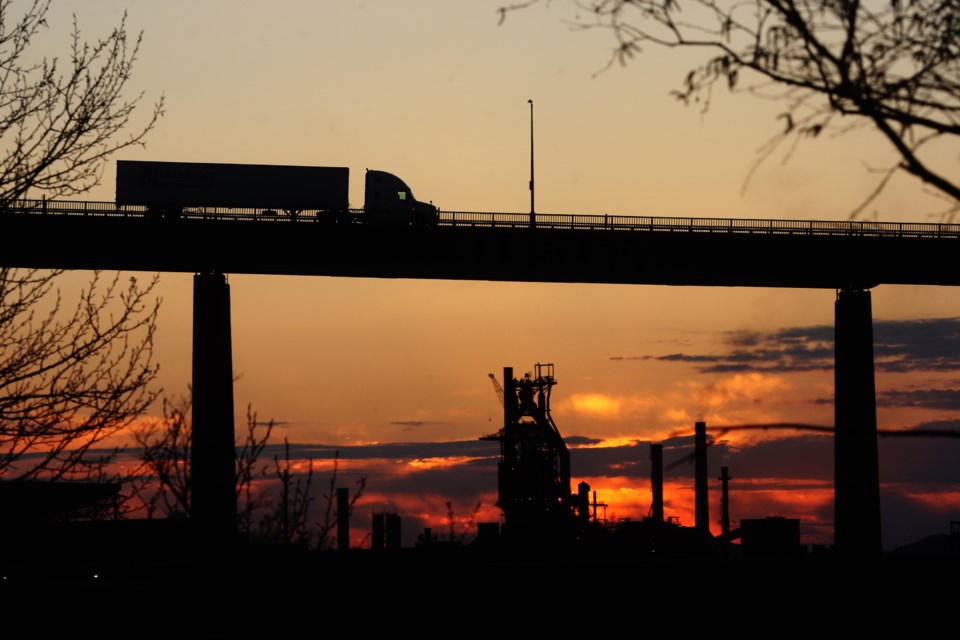Donald Trump's 25-per-cent tariff on Canadian steel is hammering Essar Steel Algoma Inc.
Ernst & Young's Brian Denega, the court-appointed monitor overseeing Algoma's emergence from insolvency protection, estimates the tariff's negative cash impact on the Sault steelmaker at $55 million during the first three months since it was slapped June 1 on imports of Canadian steel.
The estimate doesn't include September, a month when Algoma is especially vulnerable because it must stockpile raw materials in the fall to provide enough inventory to operate from January to March when the Great Lakes freeze over.
Yesterday's announcement of a new trade deal between Canada, the United States and Mexico did nothing to ease Algoma's pain.
U.S. President Donald Trump had earlier implied a Canadian exemption to the steel tariff would depend on ongoing North American Free Trade Agreement (NAFTA) negotiations.
But at a news conference yesterday announcing a new United States-Mexico-Canada Agreement (USMCA) replacing NAFTA, Trump said "the steel [tariff] is staying where it is."
"Time and time again during the NAFTA renegotiations, the Liberal government assured Canadians that it was defending our steel and aluminum sectors and the livelihoods of tens of thousands of Canadian families," Ken Neumann, Canadian director of United Steelworkers, said yesterday.
"Instead, the Canadian government struck a deal with the U.S. that fails to remove the senseless and damaging tariffs in Canadian steel and aluminum imposed by the Trump administration in June," Neumann said in a written statement. "It appears Canadian steel and aluminum workers are among those being sacrificed in the concessions made by the Liberal government in this deal."
Teamsters Canada said it was not ready to support or oppose the new trade deal, in part because of concern about Trump's steel and aluminum tariffs, which the U.S. insists are necessary to protect national security.
But yesterday's USMCA announcement was only an agreement in principle, and media reports cited Canadian and U.S. sources as saying further bargaining is expected on the steel and aluminum tariffs.
"Ultimately the devil is in the details," said François Laporte, president of the Canadian Teamsters union.
"We note with disappointment that negotiators still have not found a solution to the U.S. steel and aluminum tariffs which have been affecting Teamsters in Canada's manufacturing sector," Laporte said. "It is ridiculous for any nation – let alone the U.S. – to call Canada a national security threat."
"I don't think you'll have to use the tariffs too often," President Trump said. "But there will be cases where you have countries that are just absolutely not willing to do what's fair and reciprocal. In that case, they'll pay tariffs."
Meanwhile, the Sault's steel mill is finding the U.S. tariffs are affecting it in other ways.
Two weeks ago, the company had to ask a Toronto judge for permission to deposit $5.2 million cash collateral into a tariff-related surety bond.
"The U.S. Customs and Border Protection [CBP] requires all importers of record to post a surety bond, the size of which typically based on the annual customs charges incurred by the importer," monitor Denega said in a court filing.
"Due to implementation of the U.S. steel tariffs effective June 1, 2018, Algoma faces the risk of being required by the CBP to post a significantly larger bond on short notice," Denega said. "Non-compliance of the CBP requirements could disrupt Algoma's shipments to the U.S., causing a detrimental effect on Algoma's financial performance, operations and customer relationships."
Court permission for the new bond was needed because Essar Algoma's ability to post additional collateral is limited while it's still under shareholder protection.
Other developments of interest from recent filings in Essar Steel Algoma's insolvency proceedings:
- the British Columbia-registered numbered company that's agreed to acquire Essar Steel Algoma Inc. is now doing business under the steelmaker's former name, Algoma Steel Inc. Last year, the steel mill rebranded itself as simply 'Algoma' although for legal purposes it continues to be Essar Steel Algoma Inc. until it emerges from insolvency protection under the Companies' Creditors Arrangement Act
- advanced-stage negotiations are underway with the provincial and federal governments regarding needed concessions on pension plans, environmental issues and capital expenditure support
- Steelworkers locals have been pressing Algoma to immediately implement new collective agreements because the insolvency proceedings have been taking longer than anyone expected
- many of the steelmaker's annual contracts are up for renewal in October and the company has been experiencing uncertainty while awaiting for approval of its sale to Algoma Steel Inc.
- Essar Steel Algoma's protection from its creditors expired on Sunday but has been extended until Nov. 30
- critical advanced-stage negotiations also continue regarding the Port of Algoma. At its last meeting, Sault Ste. Marie City Council agreed to extend the completion date on the Port of Algoma project and related financing arrangements to June 30, 2019
